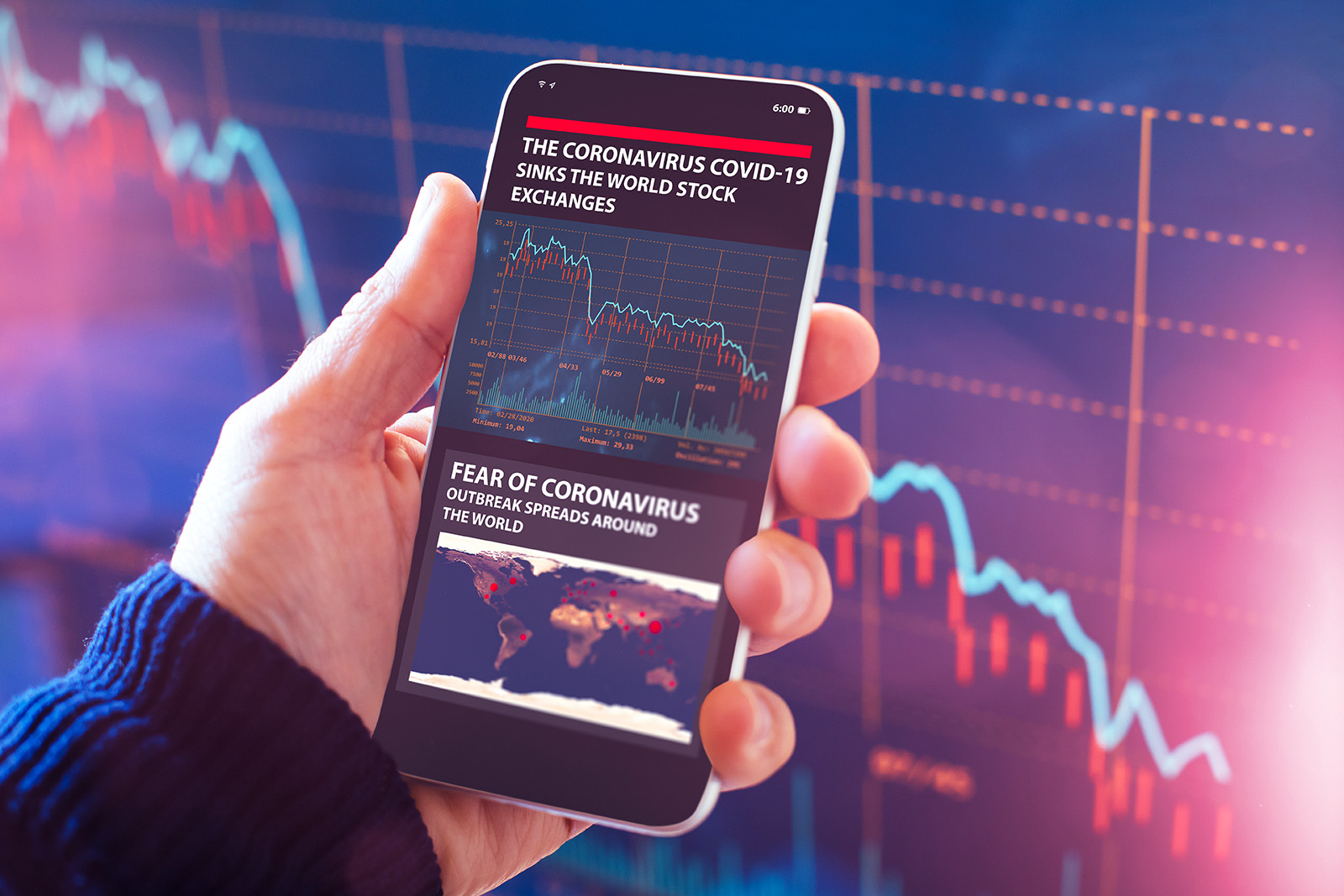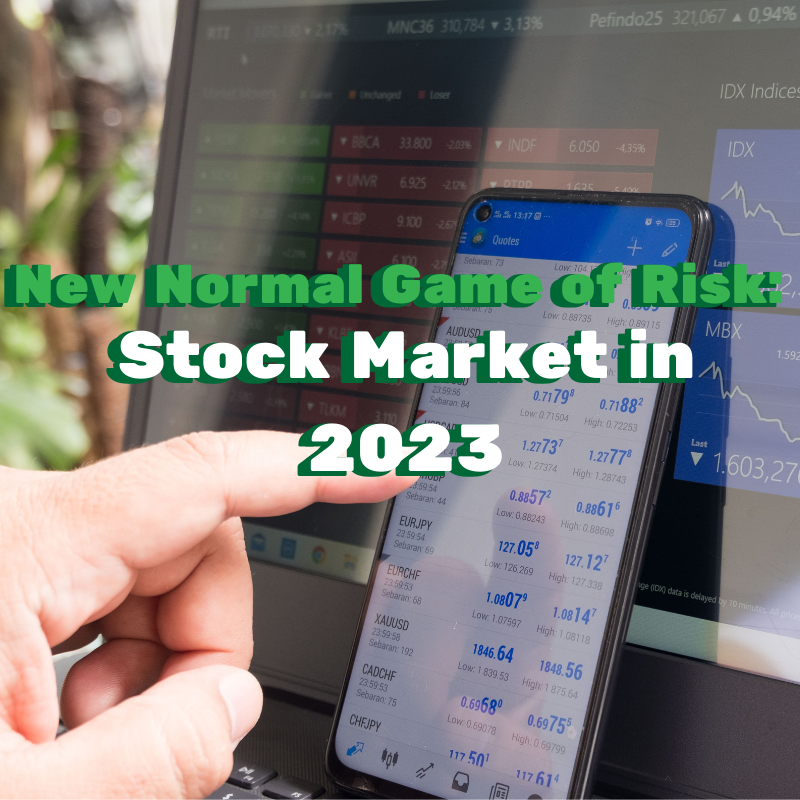No products in the cart.
Financial, Stock Market
New Normal Game of Risk: Stock Market in 2023
The stock market has always been a challenging place to invest in, and the COVID-19 pandemic has made it even more uncertain. With the new normal brought about by the pandemic, investors need to adapt and adjust their strategies to play the stock market bound successfully.
However, it is important to keep in mind that investing in the stock market carries risks, and investors should be prepared to accept the possibility of losses. Therefore, it is crucial to do thorough research and due diligence before making any investment decisions.

Stock Market in the New Normal
The stock market’s reaction to the COVID-19 outbreak and the ensuing economic effects has sparked some doubts and worries. This article examines unexpected tendencies. There is some evidence that investors favored less vulnerable companies and that government guarantees, lower policy interest rates, lockout measures, and access to credit facilities all helped to slow the stock price collapse. Fundamentals, however, only partially account for changes in the stock market at the national level. Overall, it is difficult to argue against the notion that stock prices and fundamentals have at best had weak correlations.
Since the Omicron form of the coronavirus surfaced, stocks have fluctuated drastically, renewing worries about the pandemic’s potential to harm the world economy.
Since the Covid-19 outbreak, which occurred nearly two years ago, the virus has regularly upset Wall Street’s presumptions about whether individuals would shop, travel, or even show up for work. This market turmoil is the most recent instance of this. Every new stage of the epidemic has resulted in new testing procedures, border closures, or advisories against public gatherings.
How well immunizations protect against the Omicron variant is one of many unanswered questions. However, the financial markets have handled the news easily compared to prior breakouts.
That has a pattern to it. Since February 2020, the stock market has experienced shorter pandemic-related volatility spikes, each of which was followed by a surge to a new high. After officials revealed Omicron’s existence on November 26, the S&P 500 had nearly fully regained all of its losses from its previous peak as of Monday.
The Ups and Downs of Market during Pandemic
The stock market has frequently served as a gauge for the pandemic’s course, falling in the wake of alarming developments and rising in response to improvements in vaccines and new treatments. The two have yet to follow each other, and Wall Street’s performance has occasionally ignored the pandemic’s toll on human life in favor of focusing on other elements that could boost corporate profits, such as low-interest rates and government spending.
The Federal Reserve’s actions to reduce borrowing costs and maintain capital flowing through the financial system supported the market’s recoveries following dips brought on by the pandemic. Advancements mitigated market declines in vaccines and other treatments.
The case counts continued to rise, but they also helped to focus attention on the prospects for economic recovery and growth, at least until a new development, such as the discovery of Omicron, served as a reminder of the uncertainty the world still faces.
Recent weeks have seen Wall Street economists start to lower their predictions for economic growth, with some of them citing the potential effects of the variant on the speed of reopening. The most significant danger of the new variation is that it would exacerbate the ongoing chaos in global supply networks.
It might force factories to close and worsen shortages of everything from cars to building supplies if it leads to stricter lockdowns. Prices have already risen far more quickly than analysts had anticipated due mainly to these disruptions, and recent market volatility has been worsened by the possibility that the Federal Reserve will need to slow price increases.
Stock market’s precipitous fall and subsequent record-breaking rebound in 2020
The pandemic made 2020 a year of historically rare occurrences, not the least of which was the stock market’s abrupt crash and subsequent record-breaking recovery. An economy that has been growing slowly contrasts sharply with the market’s upward surge. Monthly statistics from the Labor Department show that many small firms are having trouble, and there are more than 10.7 million unemployed workers. Despite this, the market has advanced due to predictions of a time of rapid growth following the widespread distribution of vaccines and the complete reopening of the economy.
A different group of investors, many of them young and inexperienced investors, have been attracted in part by the same expectations. According to JMP, the brokerage sector added over 10 million new accounts in 2020, with Robinhood likely accounting for about 6 million.
Michael Arone, the chief financial strategist at State Street Global Advisors, said that the epidemic had highlighted the stock market as a system that is forward-looking more than anything else. “That has been the slogan for the whole year as investors continue to wonder how the stock market could do so well while the economy, labor market, and earnings are experiencing such difficulties. Future expectations are more important than the state of the world today. Investors were generally aware of it, always keeping it behind their thoughts.
” The stocks downturn and recovery occurred at the same time as America’s response to the pandemic”
The market’s decline and recovery coincided with America’s response to the epidemic. As the virus spreads and investors waited for the vaccine, there was shock and anxiety, then hope for a recovery but with some setbacks along the road. The year 2020 began as anticipated, but things quickly turned for the worst in late February and early March as the pandemic spread and officials in countries worldwide, including the United States, shut down economic activity.
The S&P 500 has increased by more than 65% since its low in March and by almost 16% overall. For the year, the Nasdaq has risen by 44%. Stovall and other strategists say it would not be surprising to see a pullback in the early part of the new year, but he and others expect the market to end the year higher. The pandemic’s effects on the economy may be directly responsible for how investors now view the market.
Investors chose stocks that would prosper as the market emerged from its abyss and more families worked from home and sent their kids to online schools. They penalized stocks of companies like airlines and cruise ships that they could no longer profit from. They started purchasing stocks that would perform well during an economic recovery as vaccines became a reality.
According to Kinahan, retail investors can even trade more expensive stocks like Tesla and Amazon on the options market. Many of the investors, he claimed, are young and inexperienced in trading and investing. Millennials now account for about 30% of T.D. Ameritrade’s retail clients, a 35% increase in just three years. Initial public offerings (IPOs) experienced the largest wave of issuance ever as the stock market soared. Investors have also levered their holdings and margin debt is at an all-time high, a potential contrarian warning.
Why Playing in Stock Market is Worth The Risk?
Investing in the stock market can be a worthwhile endeavor for many reasons. While it is important to understand the risks and potential downsides, there are several compelling reasons why playing in the stock market can be worth it.
Potential for High Returns
One of the main reasons to invest in the stock market is the potential for high returns. Over the long-term, stocks have historically provided higher returns than other asset classes such as bonds or cash. While there are no guarantees of success, investing in well-researched, high-quality stocks can potentially lead to significant gains over time.
Diversification
Another advantage of playing in the stock market is the ability to diversify your portfolio. By investing in a range of stocks across different sectors, you can spread out risk and potentially achieve more stable returns. Diversification can also help protect your investments against market volatility and economic downturns.
Easy Access
With the advent of online trading platforms and investment apps, it has never been easier to invest in the stock market. You can buy and sell stocks from the comfort of your own home and easily track your investments using a variety of digital tools.
Compound Interest
Investing in the stock market can also provide the benefits of compound interest. This means that as your investments grow, your gains will be reinvested to generate even more gains. Over time, this can lead to exponential growth and significantly boost your investment returns.
Inflation Protection
Investing in the stock market can also provide protection against inflation. Stocks tend to perform well during periods of inflation as companies can increase prices to maintain their profits. By investing in stocks, you can potentially outpace inflation and protect the purchasing power of your investments.
Social Responsibility
For those who care about social responsibility, investing in the stock market can be a way to support companies that align with their values. By investing in companies that prioritize sustainability, social justice, and ethical business practices, investors can have a positive impact on the world while potentially achieving financial gains.

Key Takeaways from Gracia
Therefore we can say that playing in the stock market can be worth it for investors who are willing to accept the risks and do their due diligence. The potential for high returns, diversification, easy access, compound interest, inflation protection, and social responsibility are all compelling reasons to invest in the stock market. However, it is important to remember that investing carries risks and potential downsides, and investors should be prepared to accept the possibility of losses. By doing a thorough research and taking a long-term approach, investors can potentially achieve their financial objectives through stock market investing.
READ MORE RELATED BLOGS!
READ MORE AND SHARE!
TSOK Chronicles: Unleashing Passion, Dedication, and Excellence in 2024
2023 Your Practical Wedding Guide
Investments and Finance Ultimate Guide
If you like this article please share and love my page DIARYNIGRACIA PAGE Questions, suggestions send me at diarynigracia @ gmail (dot) com
You may also follow my Instagram account featuring microliterature #microlit. For more of my artworks, visit DIARYNIGRACIA INSTAGRAM


Peace and love to you.